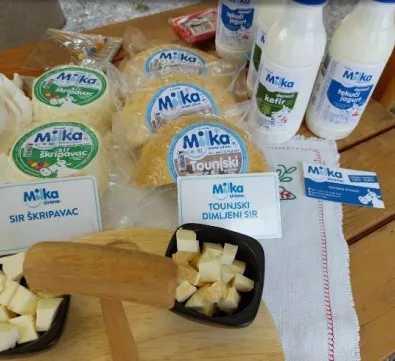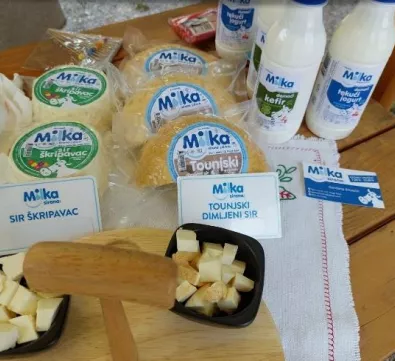Summary
The dairy company ‘Sirana Milka’ located in Duga Resa, Karlovac County, (Croatia) has successfully transformed its operations into a sustainable social enterprise. It was possible with the support of the ‘Vallis Colapis’ Local Action Group (LAG) and the project ‘Sustainability of Rural Communities through Female Entrepreneurship’ funded by the European Social Fund (ESF).
The project involved training, staff salary support, and promotional activities, resulting in the employment of five local women at the small family dairy plant. The company purchases milk from 17 neighbouring farms and supplies its products to three supermarket chains in Croatia. The company re-invests 75% of the profits into the social enterprise.
Results
As a result of the project, the company experienced a significant boost in its production and market outreach and was able to retain its three employees in production and hire two additional ones, primarily from the female workforce. All employees, both existing and new, received support through the ESF grant to complete certified education programs and gain essential skills for their work.
The project also supported the digitalisation of the enterprise, promotion and visibility. ‘Sirana Milka’ created a new website and Facebook page to enhance its online presence and increase the number of customers. Furthermore, through the project, the company actively participated in local agricultural and craft fairs, thereby increasing its recognition within the local community.
One of the most significant achievements of the project is the maintenance and slight expansion of the local network of family households producing milk for the company, demonstrating the project's positive influence on the local agricultural community.
Resources
Documents
Context
Duga Resa is a small town that developed around a major textile factory which employed thousands of workers over decades, many of them women. Poorly executed privatisation destroyed the competitiveness and production of the factory that is no longer operational. This led to a rise in unemployment in the area.
The project ‘Sustainability of Rural Communities through Female Entrepreneurship’ was designed to transform a small family-owned company into a social enterprise. The aim was to generate more job opportunities in the rural area, particularly for youngsters and women, while also enhancing the professional and business skills of employees through social entrepreneurship.
The project also focused on fostering cooperation between the newly established social enterprise and other rural enterprises.
Objectives
The project ‘Sustainability of Rural Communities through Female Entrepreneurship’ has three main objectives:
- Providing employment opportunities to the workforce, with a particular focus on unemployed youth and women;
- Implementing ecological standards in dairy production;
- Re-investing 75% of profits back into the social enterprise to fulfil its mission and become sustainable.
Activities, key actors, and timeline
The company was founded in 2015 as a local, family-owned micro company. During that time, the owners actively participated in various education and animation activities organised by the Vallis Colapis LAG as part of the NGO's commitment to rural development in the region.
It was through this involvement that they became acquainted with the concept of social entrepreneurship, which inspired them to consider transforming their business model. The technical support provided by the LAG was instrumental in guiding the company through the application process and management of the ESF grant.
In addition, a group of 17 dairy farmers in the rural area played a significant role and benefitted from this project as well. Considering that most food-processing industries in Croatia are oriented towards importing raw materials (meat, milk, etc.) from abroad, the number of local agricultural households is rapidly declining, leading to depopulation.
Consequently, only a few remaining local micro and small enterprises, such as the dairy company ‘Sirana Milka’ serve as the last organisers of local agricultural production, actively buying locally produced raw materials such as milk. This crucial socio-economic role of such SME companies is essential for the survival of the remaining farmer households in rural Croatia.
Success factors/lessons learnt
One key success factor was the valuable assistance provided by the LAG in applying for the funds and managing the reporting procedures once the funding was secured. These procedures often present significant challenges for small rural companies when navigating the process of accessing public funding.
The collaboration between the local family-owned company and the LAG exemplifies the positive impact of knowledge-sharing and technical assistance. By offering crucial support in accessing public funding, LAGs play a vital role in empowering small businesses to thrive and contribute to sustainable rural development.
Another noteworthy highlight of the project was its dedicated focus on promoting female entrepreneurship within the social economy. By providing support and reinforcement to the SME owned by a local businesswoman, the project presented a positive example of female-led social entrepreneurship and showcased their influential role in fostering collaborations with other rural entrepreneurs.
This emphasis on female entrepreneurship not only encourages gender equality, but also demonstrates the potential for women to make a significant impact in driving economic growth and development within rural communities.
Contacts
- Gordana Krivačić: sirana.milka@gmail.com
- Milan Medić: milan.medic@vallis-colapis.hr

